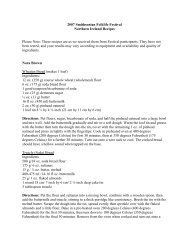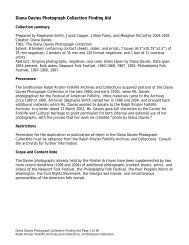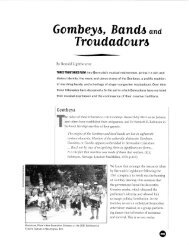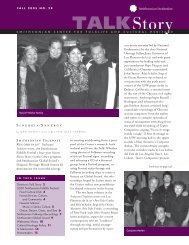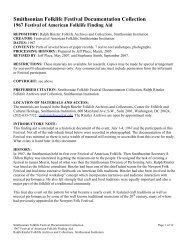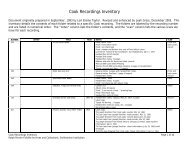Who Owns Traditional Medical Knowledge? - Smithsonian Center ...
Who Owns Traditional Medical Knowledge? - Smithsonian Center ...
Who Owns Traditional Medical Knowledge? - Smithsonian Center ...
You also want an ePaper? Increase the reach of your titles
YUMPU automatically turns print PDFs into web optimized ePapers that Google loves.
164 SITA REDDY<br />
What these three cases immediately reveal is that even within a single medical<br />
tradition, issues of heritage protection, law, and knowledge play out in very different<br />
ways. In a way these diverse narratives, each of which carries its own power<br />
and cultural anxiety, make it difficult to recognize similar threads of argument or<br />
points of convergence or even a common point of reference in the intangible heritage<br />
discourse. What these narratives share, however, is how they unfold in response<br />
to the law. As I will describe, each of these state-sponsored heritage<br />
protection schemes in turn inspired indigenous counterclaims of ownership, such<br />
as repatriation on grounds of sacrilege or defamation; secrecy on grounds of restricting<br />
heritage within particular groups; or even cultural sovereignty over an<br />
idea. Thus, if state schemes attempt to assert control over heritage by publicizing<br />
Ayurvedic medical knowledge, the indigenous responses seek to remove heritage<br />
from the public domain by further privatizing it. And all these circulating heritage<br />
claims and counterclaims, individually and together, raise serious questions about<br />
the assumptions underlying cultural ownership of traditional knowledge: questions<br />
about collective authorship and original attribution; questions about the primal<br />
authenticity of traditional, local, or indigenous knowledge; questions about<br />
commensurability with other forms of knowledge or Western science; and questions<br />
about community representation.<br />
This, then, is what the paper attempts to map: what Michael Brown calls the<br />
“Law of Unintended Consequences” with heritage protection, the as yet uncharted<br />
territory of contradictory assumptions and outcomes that the international heritage<br />
conventions set into motion, and “the fact that there will always be unforeseen<br />
effects, both good and bad, when information enters the public domain.” 14<br />
Focusing on a single system of medicine illustrates how matters that seem monolithic<br />
can often reveal a surprising complexity, even multiple pluralities, on the<br />
ground. Above all, it highlights the difficulties of umbrella heritage protection<br />
schemes in heritage policy, whether these are at the national, subnational, or international<br />
levels. One size may not fit all even within the confines of a single<br />
system of TMK.<br />
A second goal of the paper is to map medical globalization from the ground up,<br />
to locate the contested politics of Ayurvedic knowledge against current understandings<br />
of medical exchange that underlie various international UN conventions<br />
and national policy documents. At one level viewing the Ayurvedic heritage<br />
narratives collectively is thus a useful metaphoric exercise. The progressive complexity<br />
of cultural disputes over TMK allows us to trace chronologically, within<br />
the context of a single region, the shifting rhetoric underlying intangible heritage<br />
discourse over time: for example, the rapid escalation of moral panic around the<br />
cultural appropriation of Ayurvedic knowledge from biocolonialism to medical<br />
revivalism to bioprospecting and back again. 15 But at another level, these narratives<br />
also point to rifts and ruptures in the heritage discourse that open up into new<br />
spaces and new metanarratives that challenge typical understandings of medical<br />
globalization, ownership, and heritage protection.



